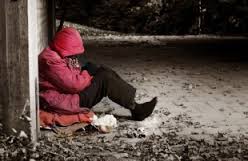Homelessness is a complicated social problem. It is important to identify the underlying causes, if remedies are going to prove effective. Federal data report that 1 in 30 school-age children experience homelessness each year in California. Sixty-five percent of the people currently experiencing homelessness attain housing within 11 months, according to recent California studies. These data help to depict the high degree of housing uncertainty that exists in our community today.
Unity Village began in 2004, when Ford Street attained Emergency Housing and Assistance Program - Capital Development funding and was able to buy an eight-unit apartment building, located at 133 & 135 Ford Street, adjacent to the 139 Ford Street campus. This housing program was designed to serve homeless families by providing transitional housing. Since 2004, housing case managers from the inland Ukiah area have met in a collaborative, facilitated manner to determine which families would be selected for Unity Village based on need. A great deal has changed since 2004, but the need for affordable housing and supportive services for homeless adults and families has not diminished.
There are twelve, two-bedroom apartments dedicated to serving homeless families on the Unity Village campus on Ford Street, funded by three different sources. The overall program is designed to improve client self-sufficiency and assist clients who either are actively parenting their children in homelessness or are in a Child Welfare Services reunification program.
The housing program offers rental assistance where the tenant pays an amount based on their income (30 percent of their adjusted gross income). For the eight permanent supportive housing apartments, the Community Development Commission of Mendocino County pays 70 percent. The remaining four transitional housing apartments are funded by a SHP transitional housing program, operated under a sub-recipient contract with the Mendocino County Health and Human Services Agency as part of HUD’s Homelessness Continuum of Care.
All participants engage in case management and other supportive services as described in their Housing Service Plan. Tenants sign a one-year lease at the beginning of the program and must be able to pass a drug test at entry and willing to remain clean and sober.
In October of 2014, Ford Street opened a small emergency shelter on the Unity Village campus. This emergency shelter offers shelter beds to single adults and families with children who are homeless Mendocino County residents. This program also offers vocational opportunities with hands-on experiential and classroom opportunities, treatment, and care coordination services, all designed to promote program participants’ knowledge, skills, and self-sufficiency. The program can serve up to 12 single male adults, 6 single female adults, and 3 to 5 families, depending on household composition. The maximum length of stay in the program is six months. Participants must be able to pass a UA at entry, be willing to remain clean and sober, and be willing and able to engage in vocational and supportive services.
Unity Village is a work in process. Later in the year, we will open a respite apartment for men experiencing homelessness and referred by UVMC. The children's activity center is also slated to open this spring, designed to provide day care and parenting support to Ford Street clients returning to school. Unity Village is a busy place, and home to up to 48 adults and 24 children. The site has been designed to look like any other apartment complex on Ford Street, as we try to minimize the "homelessness" stigma our clients face. Ford Street is dedicated to making Unity Village a safe place for people to recover, rebuild, and look forward to a better, happier, and healthier future for themselves and their families.
###
Jacqueline Williams became the Executive Director of Ford Street Project in July of 2010, after retiring from an extended career with Hewlett-Packard, where she managed teams in Procurement, Marketing Communications, Human Resources, and IT.


